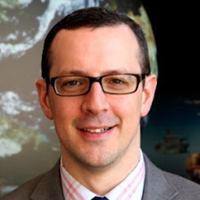Chris Vaccaro
Location: Silver Spring, Maryland
Office: Office of the Chief of Staff, Communications Division
Job Title: Communications Director
What is your educational background?
- Bachelor's degree in liberal studies (with an emphasis on meteorology and social science) from Lyndon State College in Vermont, and a masters in communications from the University of Oklahoma.
Describe the career path that led you to your current job with the National Weather Service.
- My blended formal education in science and communication led me along an equally blended path throughout my professional career. After completing my undergraduate degree, I became Deputy Weather Editor for USA Today where I created original content, including stories and graphics, to explain meteorology (and other science fields) to millions of readers. In this role, I attended press events hosted by NOAA and the National Weather Service, and I developed a working relationship with their press officers. This piqued my interest in serving in a public affairs and communications role for a science agency with a meaningful mission.
What do you do for the NWS?
- Broadly speaking, I develop and execute communication strategies to promote the people, products, and services of the National Weather Service internally with the workforce and externally with the public and stakeholders.
What was the most interesting, exciting, or impactful weather/water event you experienced while working for the NWS and why does it stand out?
- There are so many! To list a few: the then record-setting 2005 hurricane season, especially Hurricane Katrina and working with the media at the National Hurricane Center for the first time during Hurricane Rita; touring the tornado damage in Joplin, Missouri; communicating the impending threat of Superstorm Sandy; and preparing NWS Directors and NOAA Administrators to be on set at numerous television networks during high-impact weather events. The common denominator throughout is my work in promoting the agency’s life-saving information.
What made you decide to pursue a career with the NWS?
- Not to be cliché, but it was the mission. There is no better mission than protecting life and property, and underpinning our ability to do so is the NWS workforce. They are the most talented and dedicated individuals, and I am exceptionally proud to call them colleagues and to do my part in shining the spotlight on them and their work.
What do you like most about working for the NWS?
- Knowing that I am helping to educate and inform any and all of our stakeholders about the agency’s vital work. When the NWS is forecasting severe weather—whether through long-range outlooks or immediate warnings—there is a communications structure in place that brings our information directly to the public and to our media and private sector partners. Being able to amplify that information and promote the agency’s role is exceptionally important and rewarding for me.
What advice do you have for someone interested in a career with the NWS?
- Join us! The NWS has career opportunities across a wide range of occupations, including meteorologists, hydrologists, computer programmers, electronics engineers and technicians, information technology specialists, budget analysts, management and program analysts, program managers, and many more. And the NWS has tremendous geographical offerings with offices across the U.S. and its territories. Learn more about NWS careers at weather.gov/careers and sign up for NWS job notifications on usajobs.gov.
What training or coursework would you recommend to someone interested in following your career path?
- Blend disciplines! I combined science and communications. By diversifying your studies and your experiences, you can pursue a wider range of career opportunities and bring different perspectives to jobs that you hold. As for writing, practice makes perfect. Find opportunities to write and learn editing skills and seek constructive feedback to sharpen your writing ability. Reading can also make a strong writer.
